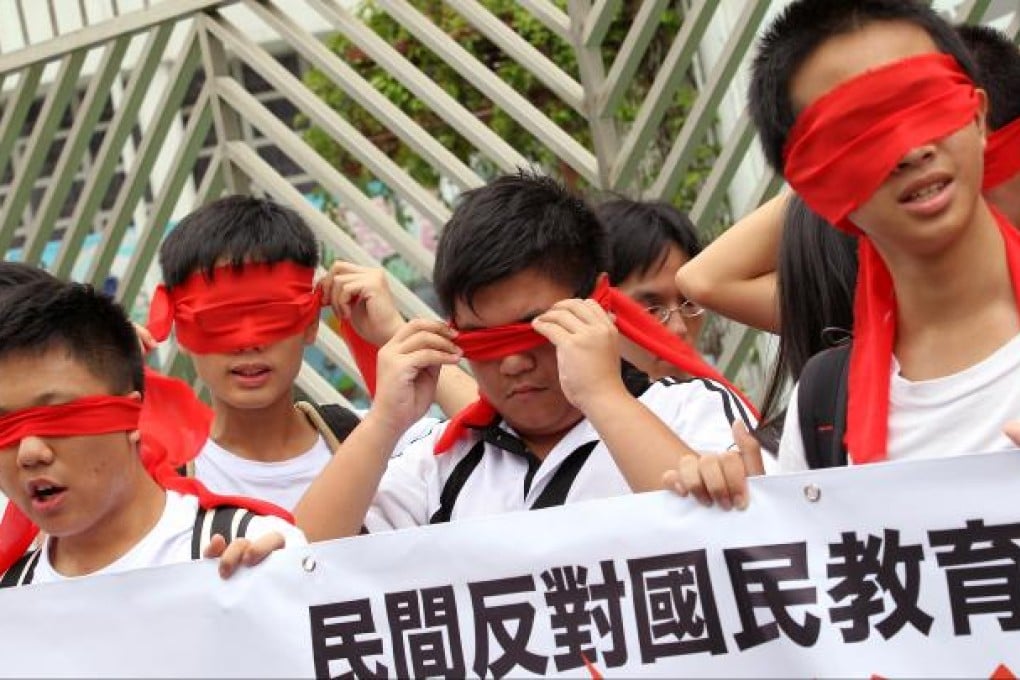
The new school year is set to commence in a week’s time. Hundreds of thousands of elementary school children will begrudgedly put down their video game consoles and return to the classroom. Depending on the school they attend, some of them will find a curious new subject squeezed into their already jam-packed timetable. It’s called Moral and National Education (德育及國民教育) or MNE.
Inside the P-1 classroom and atop the teacher’s desk, a stack of never-before-seen textbooks await: a glossy paperback with the Great Hall of the People on the cover. Flip to the chapter “I learned the National Anthem Today” and there are instructions for an in-class activity: sing along to The March of the Volunteers and repeat after the teacher: “I am proud to be Chinese!”
National education is an initiative eight years in the making. Taking directives from Beijing, Donald Tsang’s administration began designing a program in 2004 with the sole goal to instill patriotism in the city’s youths. The motive is clear. Party leaders up north have long been fed up with the islanders down south who identify themselves as “Hong Kongers” rather than Chinese. Since the Handover, negative press coverage of the Motherland, competition from rival cities like Shanghai and Beijing, and the daily cultural clashes with Mainland tourists have all contributed to a growing anti-China sentiment in the former British colony. Beijing is convinced that our lack of national identity is a result of British colonial brainwashing. As one commentator for The China Daily, a Communist Party mouthpiece, puts it: “the [British] colonial rule sought every means to alienate Hong Kong and the Mainland, [and] sow the seeds of estrangement between us...” The white-washed population in Hong Kong needs to be reprogrammed. And since indoctrination is most effective if started at an early age, what better place to begin than first grade?
Consider it Donald Tsang’s parting gift to Hong Kong. In his final policy address before leaving office in disgrace, Tsang proposed the introduction of MNE as a standalone subject in primary schools by 2012 and in secondary schools a year later. As is the case for many of his policies, Tsang short-circuited the public consultation process and drew widespread opposition from concerned parents and teachers. Tsang and his education minister were caught flat-footed and had to come up with a face-saving compromise. This past January, the Education Bureau offered a truce: a three-year grace period allowing grade schools to voluntarily adopt MNE beginning in 2012 with the subject becoming mandatory in 2015. That explains why only some – not all – elementary schools in the city will roll out MNE when the fall term begins next week. The trailblazers consist of two groups: government schools and so-called “red schools” that rely on funding from Beijing-backed organizations.
Then came The China Model (《中國模式》), a controversial handbook published by the National Education Service Centre (NESC) founded and funded by the Education Bureau. Intended as a guideline for MNE teachers, it is an unabashed tribute to Communist China that praises its achievements and mentions none of its failures. One-party rule, for instance, is hailed as a superior political model to multi-party democracy plagued by endless bickering and paralyzing partisanship. The handbook is so biased it makes the description of the Pacific War in a Japanese history textbook look fair and balanced. The public was shocked, for it needed no further evidence that MNE is Orwellian brainwashing in poor disguise. In an abrupt about-face, government officials disavowed the NESC and called the handbook “rubbish.” But it was too late. On one of the hottest Sundays on record, 90,000 outraged parents and educators took to the streets demanding the entire program be scrapped. Another mass rally has already been planned for 1 September.


